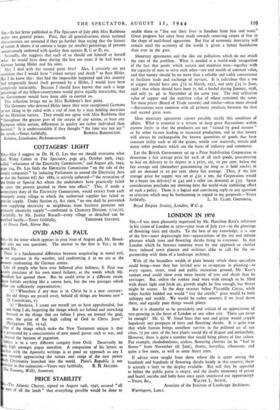PRICE STABILITY
,---The Atlantic Charter, signed on August 14th, 1941, assured "all men of all the lands" that everything possible would be done to enable them to "live out their lives in freedom from fear and want." Great progress has since been made towards removing causes of fear in the shape of mail-fisted aggression. But fear of economic insecurity will remain until the economy of the world is given a firmer foundation than ever in the past.
Monetary agreements and the like are palliatives which do not attack the root of the problem. What is needed is a world-wide recognition of the fact that goods which sustain and maintain men—together with
the capacity of men to serve each other—are real wealth of constant value, and that money should be no more than a reliable and stable convenience to facilitate trade and exchange of services. It is ridiculous that a ton of copper should have cost £72 in March, 1937, and only £35 in June,
1938; that wheat should have been 7s. 6d. a bushel during January, 1938, and only 3s. 4d. in November of the same year. The real utilitarian value of copper and the nutritive value of wheat remained the same. Yet these prices (Board of Trade records) and similar—often more absurd —fluctuations were common with all primary products between the first and second great wars.
Mere monetary agreement cannot possibly rectify this condition of affairs. What is essential is a system to keep price fluctuations within narrow limits so that the producers are not "ruined by good seasons" or by other factors leading to increased production, and so that money will always be exchangeable for known quantities of goods that have constant utility such as all the grains, textile raw materials, metals and many other products which are the bases of industry and commerce.
Let the British Government set up a Price Stabilisation Corporation to determine a fair average price for each of all such goods, guaranteeing to buy on delivery to its depots at a price, say, to per cent, below the fair average and (thereafter) guaranteeing (so long as it held stocks) to sell on demand at to per cent, above fair average. Thus, if the fair average price for copper was set at £50 a ton, the Corporation would be a buyer (on delivery) at £45 and a seller (on demand) at £55. Space consideration precludes my showing here the world-wide stabilising effect of such a policy. There is a logical and convincing reply to any question or criticism which may be forthcoming in regard to my proposals.—Yours
Royal Empire Society, London, W.C. 2.


























 Previous page
Previous page